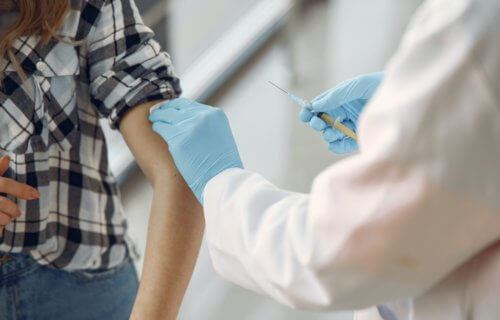LINCOLN, Neb. — Despite four decades of research, there is still no approved cure for either form of the herpes virus, HSV-1 or HSV-2. Now, a new study is revealing exciting progress towards a potential vaccine. Researchers at the University of Nebraska-Lincoln say a genetically edited form of the herpes simplex virus can significantly cut the symptoms of genital herpes and reduces its ability to spread to others.
The genetically-modified version of HSV-1 has been rewired to keep it from hiding in the nervous system and escaping the body’s natural immune response. The study finds this new approach greatly outperforms the leading vaccine candidate for herpes.
Experiments on guinea pigs reveal this vaccination offers protection from both forms of the illness. HSV-2 is the sexually transmitted version of the disease which is responsible for infections in the genital areas. HSV-1 is infamous for its most common symptom, causing cold sores around the lip. The World Health Organization (WHO) believes over 500 million people have HSV-2, which stays with patients throughout their life. In addition to causing lesions and blisters, health officials say HSV-2 can heighten the risk of contracting HIV.
The animals vaccinated in this study developed fewer genital lesions and experienced less replication of the virus. They also shed less of the virus, meaning the guinea pigs were less likely to spread the disease to others.
Why has a herpes vaccine been so elusive?
Researchers say the main problem with developing a vaccine for herpes is alphaherpesviruses (which include HSV) have evolved to become experts at avoiding the immune system. The study finds once HSV infects the tissues in the mouth or genitourinary tract the disease moves into the tips of sensory nerves. These nerves are responsible for transmitting the sensations of pain and touch.
Using a specialized molecular switch, the virus invades the nerve cells and moves along the nerve fibers until it reaches the nucleus of a sensory neuron. This is where it hides from the human immune system.
Nebraska researchers Gary Pickard and Patricia Sollars spent years mapping how HSV travels through the nervous system. With help from Tufts University’s Ekaterina Heldwein, they were able to map out the structure of the alphaherpesvirus protein pUL37. The study revealed three regions that may help the protein evade the immune system.
Northwestern’s Gregory Smith specifically removed and replaced five codons (coding information within DNA) from these regions in the virus; hoping the mutation would keep HSV from breaking into the nervous system.
Making mutations can be tricky
Study authors say this mutation, called R2, did keep the virus from moving deeper into the nervous system of mice. While the results showed promise, scientists initially feared if the vaccine would hold up.
“You can keep the virus from getting into the nervous system,” says Pickard in a university release. “That’s not that hard to do by making broadly debilitating mutations. But when you knock down the virus so much that it doesn’t replicate well, you are not rewarded with a robust immune response that can protect you from future exposures.”
Luckily, further research revealed the R2 virus avoided the typical problems with mutations and continued to work as a vaccine. Researchers say other herpes vaccine candidates in the past have run into issues by using mutations which are too weak or too strong to create the proper immune response.
“So it’s the same story over and over again: Either your subunit vaccine doesn’t present enough antigens, or you make the live virus essentially so sick that it doesn’t work really well to generate an immune response,” Pickard explains. “That’s why we’re so optimistic about our R2 platform, because it avoids all those problems.”
Beating out other vaccines
David Bernstein, a researcher at Cincinnati Children’s Hospital Medical Center, tested the potential new treatment on guinea pigs injected with HSV-2. Just one of the 12 R2-vaccinated guinea pigs developed lesions after being infected with the herpes-2 virus. This was a major improvement from five out of 12 who still became symptomatic after being vaccinated with another treatment. The team says that potential vaccine also failed a human clinical trial.
“The fact that the viral shedding was knocked down so much with the R2 vaccine is really important, because it’s the viral shedding — even if it doesn’t cause lesions — that can then pass on the virus,” Pickard says. “If you have genital herpes, you can pass that on to your significant other, not knowing that you’re doing it. It’s very problematic. So the fact that the shedding was knocked down so much is a really good sign.”
Researchers are now looking at making a new version of the R2 vaccine specifically tailored for HSV-2.
“If you’re making antibodies against the proteins of that particular virus, it stands to reason (that) it would work better than if you’re making an antibody against something that’s slightly different,” the study author concludes. “So that’s our expectation.”
The study appears in the journal Nature Vaccines.

It’s really very practical study. We advocate CDC to approve the vaccine seeing the burden on mns of people world wide.
Yes, please help us advocate for fast approval and ‘right to try’ type of testing. I would do anything to see this work and funded in the next year to have any glimmer of hope
Please can you do a follow up article? We’re desperate for a cure asap. The mental anguish is worse than a virus that doesn’t even do anything to you for the most part. The thought of having to tell someone and face the likely rejection is too much to bear.